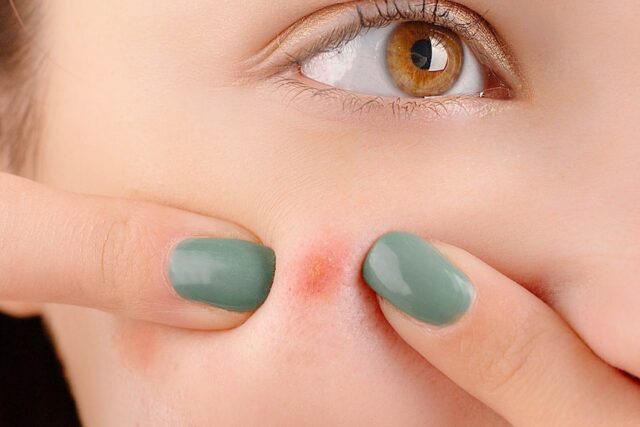Acne, a common skin concern, is often misconstrued as a purely cosmetic issue. However, it’s crucial to understand that acne frequently signals underlying health problems. These blemishes are not randomly occurring; they’re often your body’s alarm system signaling imbalances within. Imbalances can range from hormonal fluctuations, and poor gut health, to unchecked stress levels. To effectively combat acne, it’s not sufficient to focus solely on surface-level treatments; addressing these underlying health problems is key. In the subsequent sections, we’ll delve deeper into these causes, their interplay with acne, and strategies to manage them, thereby providing a comprehensive approach to acne control.
Professional Treatments
The doctor’s route is often the first choice when it comes to treating acne. Dermatologists specialize in skin health and can help identify underlying conditions that may be causing acne flare-ups. They typically prescribe topical creams, oral medications like antibiotics or hormonal birth control, or procedures like acne scars treatment, chemical peels, and laser therapy. However, these treatments only provide temporary relief as they do not address the root cause of acne. Moreover, they can have side effects and are expensive in the long run. If you’re considering professional treatments, it’s best to combine them with a holistic approach that treats the underlying health problems responsible for acne.
Hormonal Balance
Hormonal fluctuations influence sebum production in your skin, an excess of which can lead to acne. Addressing hormonal imbalances can help regulate sebum production, thus controlling acne. Common hormonal imbalances in women include Polycystic Ovary Syndrome (PCOS) and premenstrual acne. PCOS, a common endocrine disorder, can cause increased levels of male hormones resulting in oilier skin, acne, and unwanted hair growth. Premenstrual acne occurs due to the fluctuations in estrogen and progesterone levels before menstruation which can cause increased sebum production. To address hormonal imbalances, a doctor may prescribe birth control pills or other hormonal medications.
Gut Health
A poor gut microbiome can trigger inflammation and oxidative stress, both of which can aggravate acne. Restoring gut health can help reduce these effects and subsequently, acne outbreaks. Probiotic supplements, fermented foods like kimchi and kombucha, and a diet rich in fiber can help maintain a healthy balance of gut bacteria. Avoiding processed and sugary foods may also prove beneficial. Overusing antibiotics can harm the gut microbiome by killing off beneficial bacteria, so it’s best to avoid them if possible. Many studies have also linked gut health with mental health, and addressing underlying stress levels can significantly improve gut health. Moreover, acne itself can cause psychological stress, so it’s vital to break this cycle by addressing both acne and mental health.
Stress Levels
High-stress levels can exacerbate acne through inflammation and increased sebum production. Managing stress can, therefore, help better control acne. Some effective stress management techniques include regular physical exercise, meditation, and deep breathing exercises. Getting enough sleep is also crucial in reducing stress levels and promoting overall skin health. If you struggle with chronic stress or anxiety, seeking therapy or counseling can be beneficial. Stress often has a direct connection with diet, and addressing both can provide long-term relief from acne. Most importantly, it’s essential to identify and eliminate sources of stress in your life, whether it’s a toxic work environment or unhealthy relationships.
Diet
Certain dietary habits can trigger acne. Consuming high-glycemic foods, dairy, or other acne-aggravating foods can cause flare-ups. Modifying one’s diet to exclude these foods can significantly help in acne control. A diet rich in anti-inflammatory foods like fruits, vegetables, and healthy fats can also promote clear skin. Moreover, incorporating essential vitamins and minerals like zinc, vitamin A, and omega-3 fatty acids can help regulate sebum production and reduce inflammation. Consulting with a nutritionist or dietician to create an individualized diet plan may prove beneficial.
Sleep
Lack of adequate sleep can lead to hormonal imbalances, increased stress, and systemic inflammation, all of which can contribute to acne. Ensuring sufficient sleep is, therefore, another key factor in controlling acne. Aiming for 7-9 hours of restful sleep each night can help regulate hormones and reduce stress levels. Additionally, maintaining a regular sleep schedule and creating a relaxing bedtime routine can improve the quality of sleep. Aside from its impact on acne, getting enough sleep is crucial for overall health and well-being. Most of all, it’s essential to listen to your body and prioritize rest when needed. This will not only minimize acne but also promote a healthier and more balanced lifestyle.
Exercise
Regular exercise helps reduce stress levels, promote hormonal balance, and improve overall health, all of which can aid in acne control. Engaging in physical activities that you enjoy, such as running, dancing, or yoga, can help reduce stress and promote mental well-being. Exercise also increases blood flow and oxygen to the skin, promoting a healthy glow. However, it’s crucial to shower and cleanse your skin immediately after exercise to prevent sweat from clogging pores. Working out daily might not be feasible for everyone, but incorporating physical activity into your daily routine, like taking the stairs instead of the elevator or going for a walk during lunch breaks, can make a significant difference in acne control. Most importantly, it’s essential to find a balance between exercise and rest to avoid over-exertion and increased stress levels.
Skincare Routine
While managing underlying health problems is crucial for acne control, a good skincare routine is also essential. Using gentle products suited to your skin type, removing makeup before bed, and avoiding over-cleansing or harsh scrubs can help maintain a healthy skin barrier. Incorporating acne-fighting ingredients like salicylic acid or benzoyl peroxide into your skincare routine can also aid in controlling breakouts. However, it’s vital to be patient and allow time for these products to work, as overusing them can irritate the skin and worsen acne. Furthermore, always remember to moisturize your skin, regardless of its oiliness. Using a non-comedogenic moisturizer can help maintain the skin’s moisture balance and prevent excess sebum production.
In conclusion, addressing underlying health problems is key to acne control. Hormonal imbalances, gut health, stress levels, diet, sleep patterns, exercise habits, and skincare routine all play a crucial role in managing acne. Moreover, making lifestyle modifications and seeking professional help when needed can provide long-term relief from acne. By taking a holistic approach to skincare, one can achieve clear, healthy skin and improve overall well-being. Remember to listen to your body, be patient with the process, and prioritize self-care for optimal results. Keep learning about your skin and its needs, and don’t be afraid to seek help and make changes for better acne control.














